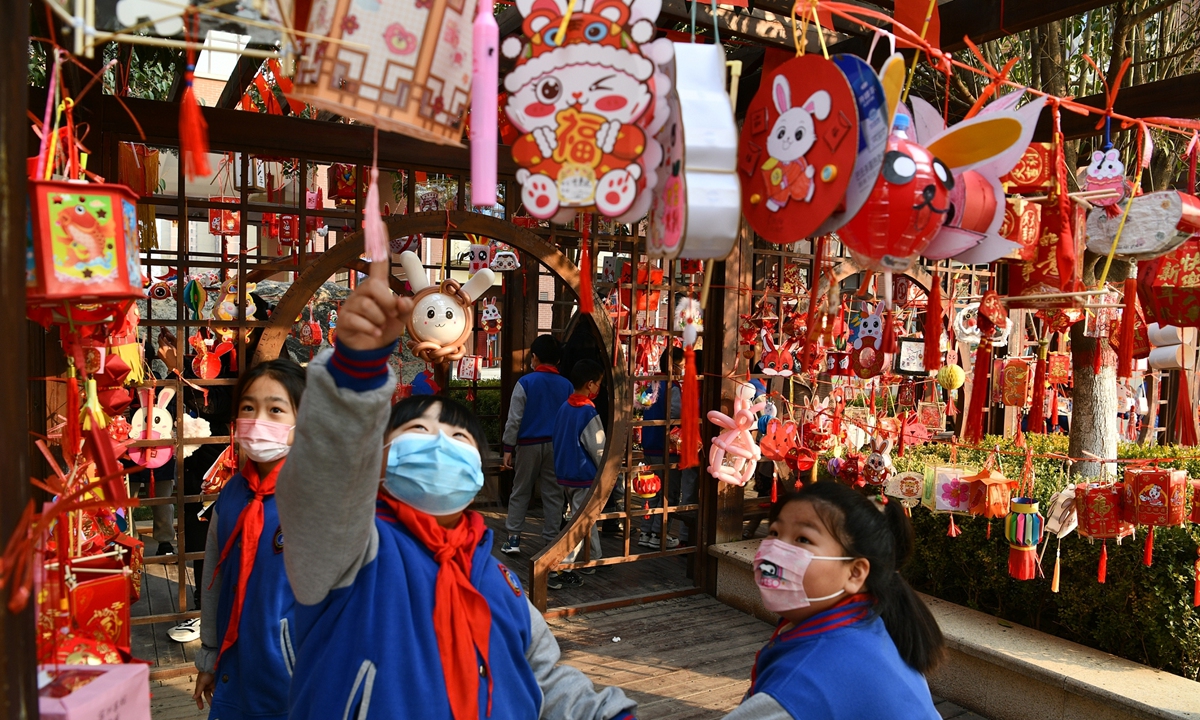
Primary school students watch a lantern exhibition on campus on their first day of the new semester in Shijiazhuang, North China's Hebei Province on February 7, 2023. (Photo: VCG)
After attending "online schools" for three years, students and teachers in China are finally meeting their beloved classmates as they move on-site in the upcoming spring semester, with nearly 300 million people expected to return to campuses nationwide.
As the first batch to be "tested" after China downgraded its COVID-19 management, authorities urged educational institutions to fully restore the normal operation of teaching activities while ensuring the health and safety of students and teachers.
Ahead of the new semester, Chinese Vice Premier Sun Chunlan visited a number of campuses in Beijing on Monday, including world-renowned Peking University and Tsinghua University. She urged schools at all levels to implement and optimize relevant COVID-19 prevention management and fully restore the normal operation of teaching activities.
The health of students and teaching staff as well as the safety of campuses must be ensured, Sun stressed.
Before the start of the semester, schools should do thorough research on how many students and teachers had been infected and organize their return in an orderly manner. School hospitals should prepare medications in advance and monitor the health status of personnel within the campus, Sun noted.
With regard to the mental health of students and teachers due to the impact of COVID-19, she urged more attention and education be given in this regard. Schools should carry out leisure activities based on the characteristics of different age groups so as to create a more positive atmosphere.
"No nucleic acid tests, no health codes, everything is returning to normal! Students can freely enter or leave the campus without any form of permission, and canteens are also open for dining in," Wang Wei, professor at the School of Interpreting and Translation of Beijing International Studies University, told the Global Times on Tuesday.
A high school teacher in Beijing, surnamed Hua, said she can feel the excitement from herself and her students and their parents as three years of online classes finally end.
"Parents are mostly thrilled about this news," Hua told the Global Times with big smiles. "On-site teaching is much better than online classes in terms of efficiency and interaction. We did not see much of each other in the last semester, and I am looking forward to seeing my students very soon," she said.
Hua's school is collecting the number of infections, the vaccination status and underlying physical conditions among students and staff, and it has ended the mandatory reporting of travel outside Beijing. However, body temperature checks and face masks are still required.
A teacher from Qibao Wenlai School in Shanghai surnamed Tang said that there are no particular requirements for epidemic prevention in his school and wearing a mask is no longer mandatory.
"Both teachers and students are looking forward to the new semester when face-to-face education can be carried out normally. We hope the situation can completely return to the pre-epidemic period so that the impact of the epidemic on education activities could be minimized," Tang said.
In the latest guidebook on epidemic prevention and control issued by the State Council, schools that have not reported COVID-19 infections can restore on-site teaching normally. Health monitoring will be conducted for seven consecutive days after students and faculty return to campus, and schools should minimize gatherings.
Higher education institutions will no longer conduct nucleic acid screening for all members, but will conduct nucleic acid or antigen testing for key personnel engaged in catering, logistics, security and cleaning on campus, the guidebook said.
Students and teachers at various levels of educational institutions are no longer required to provide nucleic acid test results in order to enter or leave the campus, it added.
To prevent the potential spread of the virus, schools must stockpile drugs for COVID-19 infection treatment regularly and prepare sufficient antigen tests, masks and other medical materials.
Zhuang Shilihe, a Guangzhou-based medical expert, told the Global Times on Tuesday that the risk of a large influx of students bringing in new waves of infection is relatively low.
The biggest risk with the largest scale of personnel flows happened during the Spring Festival holidays and the period passed smoothly without bringing in a new spike. The majority of people were infected in the last round of the epidemic in December, with about 90 percent of people infected in Beijing and some 80-90 percent in Guangzhou, South China's Guangdong Province, he said.
"This formed an immune barrier against the virus, and with the inoculation of a full course of vaccines among the vast majority of students, the mixed immunity has formed even stronger protection," the expert said.
However, he reminded people that mask wearing and good personal hygiene are still necessary to prevent other infectious diseases such as the flu.


